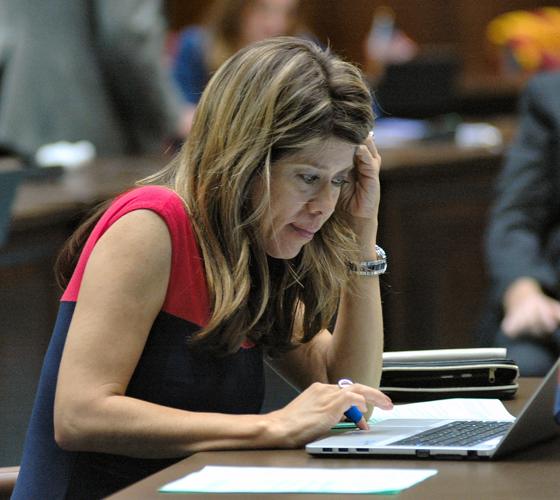PHOENIX — State lawmakers completed the 2017 legislative session Wednesday evening with millions of dollars in new and expanded tax breaks for businesses that sponsors say will help economic development.
Legislators approved providing another $10 million in state income-tax credits for “angel” investors who put money into qualified small businesses. They also revamped a fund to provide grants to “micro-enterprises” — essentially small businesses with few employees.
Separately, they gave final approval to restoring lifetime eligibility for Temporary Assistance for Needy Families to two years, the way it was before Gov. Doug Ducey signed legislation trimming that by half two years ago. But the measure includes some conditions on getting that second year of cash assistance, provisions Democrats said are designed to trip up recipients.
But the big action Wednesday was the decision to provide even more financial incentives for manufacturers, some of whom already get special property-tax treatment and a few of whom may be paying no state corporate income taxes at all.
Senate President Steve Yarbrough did not dispute that existing laws and what is in SB 1416, approved by the Senate 21-6 and the House 32-21, will minimize what some companies pay not only to the state but also in local property taxes.
But he said that has to be weighed against the promises by firms such as Intel, which said it will be investing more than $7 billion to refurbish and occupy a vacant chip-manufacturing facility it built years ago in Chandler, Yarbrough’s hometown. And that, he said, will create new revenue streams.
“You’re missing all of those people who have jobs at Intel who make six-figure salaries, who pay income tax, who pay property taxes on their home, who pay sales taxes at all the places they buy stuff,” he said.
But House Minority Leader Rebecca Rios said the record in Arizona disproves the theory that tax breaks for businesses will grow the economy.
She cited a recent report that various tax exemptions and credits in Arizona total $14 billion, more than the $9.8 billion state budget. But Rios said the state budget is essentially equal to what it was a decade ago, “with more than half a million more people in Arizona.”
“Where’s all this revenue that’s flooding into the state?” she asked.
“We have no proof that tax credits like this one are actually working,” added Sen. Martin Quezada, D-Glendale.
Rep. Pamela Powers Hannley, D-Tucson, took issue with provisions of the bill that extend special tax credits to firms to reimburse them for the cost of doing research and development.
She said the state is forgoing millions of dollars of taxes. But Powers Hannley said that’s not the worst of it.
“This bill also gives away millions of dollars in research royalties into the future, with no end date,” she said, research that was financed by taxpayers in the first place.
“Giving away all the intellectual-property rights is a huge potential loss of future revenues,” Powers Hannley said. “When the voters fund research or fund anything, the voters should get a return on their investment.”
But not all the Democrats were opposed.
“Not only will SB 1416 create thousands of high-paying jobs to thousands of Arizonans, but will catapult economic development in the right direction,” said Rep. César Chávez, D-Phoenix. He said graduates from the state’s three universities are “fleeing” because there are not enough jobs available.
House Speaker J.D. Mesnard, reflecting a philosophical difference between the parties, took particular issue with Rios’ contention the state is giving away tax breaks.
“Not taxing something is not the same thing as giving it away,” he said. “ ‘Giving it away’ suggests we own it.”
The money, he said, belongs to the taxpayers. “They own it and then we force it from them, yes, to provide services for various things,” Mesnard said. “But there’s a very important distinction.”
The provisions in SB 1416 come on top of the special tax treatment that certain large corporations already get, including those research-and-development tax credits, which can equal 24 percent of what a company spends.
Arizona also has created “foreign-trade zones,” where the property tax on businesses is just a fraction of what it is on firms whose facilities are located elsewhere.
And multistate corporations are allowed to compute what they owe in Arizona corporate income taxes based entirely on what percentage of the products they make are sold in the state. That potentially reduces the liability to manufacturers whose products are made here and shipped elsewhere.
That break is even more significant for firms like Intel, whose computer chips are sold to other firms nationally and worldwide, and Raytheon which has little Arizona audience for its missiles.
SB 1416 would also create an accelerated depreciation schedule for any equipment purchased by manufacturers.
That break relates to the fact that Arizona law imposes property taxes not only on land and buildings but also on business equipment, from major presses to computers and desks. The value of that equipment is based on the purchase price, a figure that is adjusted annually for depreciation.
This legislation allows businesses to write off half the value in the first year alone, a move that provides an immediate break on what already is a reduced property-tax rate. That will particularly help companies that are in the market for major new equipment, like Intel.









